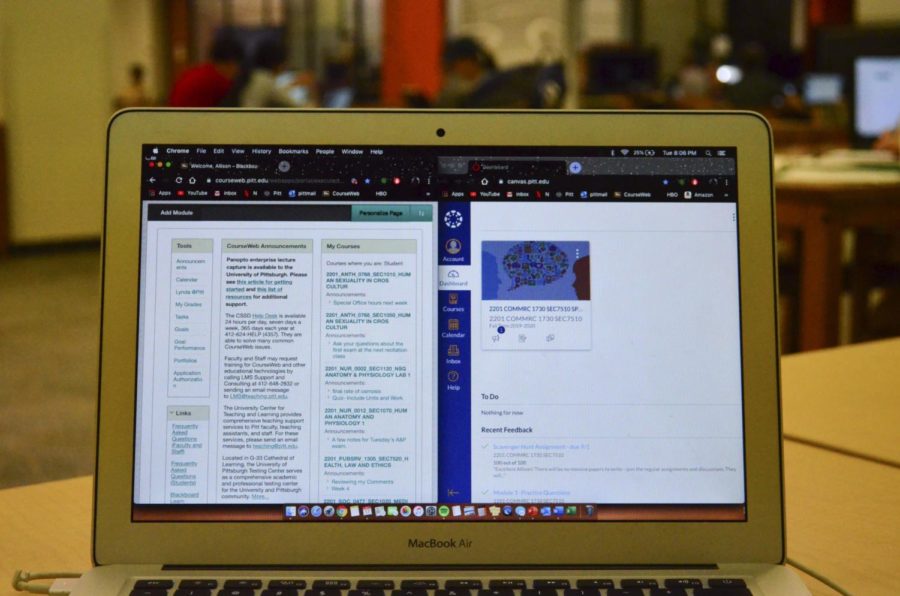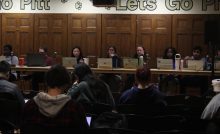Pitt addresses technology concerns ahead of start of online classes


Beginning Monday, Pitt will continue classes online for the remainder of the semester.
With classes set to resume on Monday, Pitt’s faculty has scrambled to shift courses over to an online format. This rapid transition has left some IT personnel questioning whether Pitt’s website can handle the amount of traffic.
At Thursday’s Senate Council meeting, Kenny Doty, a specialist in online learning and technology services in Swanson School of Engineering’s IT department, said he isn’t sure what will happen on Monday when the University goes online. Doty is encouraging engineering faculty to have a back-up plan.
“We have no idea what this is going to look like when everyone goes online,” Doty said. “What I’ve been recommending to our faculty is [to] have contingency plans in place. Be ready to present your content in an offline manner, specifically recorded lectures.”
To help students without reliable technology at home, Pitt has 50 iPhones available for distribution and is expecting 200 Chromebooks next week — which all students are eligible to request — according to University spokesperson Kevin Zwick. Zwick said students who lack a device or connectivity should register a request with the 24/7 IT Help Desk by calling 412-624-HELP (4357).
Chancellor Patrick Gallagher announced last Wednesday that Pitt would cancel classes and then move them online indefinitely beginning March 23 while still finishing the semester on April 24. This comes in the wake of the global SARS-CoV-2 coronavirus pandemic that has claimed the lives of 112 Americans. Gallagher also announced in a Wednesday email that the University will further reduce its operating presence beginning Friday at 5 p.m. and postpone spring commencement.
Throughout the week, professors have shifted to an online format utilizing resources provided by the University Center for Teaching and Learning and specific departments. Professors will be utilizing a combination of previously accessible software like Courseweb, Canvas, TopHat and Skype for Business as well as new software such as Zoom, a video-conferencing app.
Departments and individuals professors had discretion in making decisions regarding syllabi, grading, specific class resources as well as transitioning primarily in-person academics like labs, clinicals and studio classes online. Gallagher and Provost Ann Cudd indicated at the Senate Council meeting that they will soon announce a decision about whether students will have the opportunity to take courses on an elective pass/fail basis like more than a dozen universities across the country, including neighboring Carnegie Mellon.
Melinda Ciccocioppo, a lecturer in the psychology department, said the UCTL provided resources, but she mostly relied on outside sources and peers within her field when designing her class. Ciccocioppo teaches about 670 students in her Introduction to Psychology course and 35 in Psychology of Gender.
“The administration has given us resources, especially the UCTL with online workshops and support,” Ciccocioppo said. “Mostly what I’ve been turning to is my psychology peers. There’s a Facebook group I’ve been monitoring where people have been sharing tips.”
She added that this move was difficult, especially because she has never taught an online class before and was concerned for her students’ well-being.
“I’ve personally never taught an online class before, and that’s the situation for many of us,” Ciccocioppo said. “We’re trying to maintain this level of academic rigor at Pitt, but at the same time I have to kind of balance that with the needs of my students.”
Ciccocioppo heeded IT’s warnings and, like many professors, is already planning to use some type of asynchronous communication, like recorded lectures. Ciccocioppo said she made this decision after receiving an email from a student in India.
“I’ve changed my stance based on my students, because I was originally thinking we’d just do class as usual at our normal time,” Ciccocioppo said. “I actually got an email from a student who was letting me know that she had to return home to India, so I realized I can’t require them to be in front of a computer at a certain time.”
Ciccocioppo said she will also make use of software students are accustomed to, including Courseweb and TopHat, to prevent overwhelming students with new technology.
“I’m not requiring students to learn anything new, because I’ve made it my plan to make it as non-stressful as possible,” Ciccocioppo said. “The last thing I want to do is stress people out, weaken their immune systems and make them more susceptible to the virus.”
Ciccocioppo incorporated this same philosophy into testing, which she called the “trickiest” part of the process. She said there was added difficulty in designing new tests for a class as large as Introduction to Psychology, but she eventually made the decision to shift to an open-book, open-note exam.
“When I looked into what can be done to prevent cheating, it’s all things like timing the test, timing individual questions and preventing backtracking. The more I read it, the more it seemed so anxiety-producing,” Ciccocioppo said. “I felt like I wasn’t going to be assessing knowledge, but processing-speed, so I’m going to open-book, open-note exams.”
On the other end of the spectrum, Anjali Sachdeva, a lecturer in the English department, teaches primarily discussion-based courses with 16 students in Introduction to Fiction Writing and 20 in Writing for the Public. She said she will be using a combination of video-conferencing over CourseWeb for discussion as well as replacing in-class assignments with short quizzes.
Both Ciccocioppo and Sachdeva are providing accommodations for students with disabilities or for those without or with minimal internet access. Sachdeva is allocating extra time on quizzes for students with disabilities and Ciccocioppo is not timing tests to avoid the problem all together. Ciccocioppo said students should reach out to professors and share their concerns.
“It’s worth talking to faculty members if there is a concern, and if there is something that is not going to work for you and not waiting until the end of the semester,” Ciccocioppo said. “There’s a lot of things we haven’t thought of, because this happened really fast.”
Sachdeva recommends that students maintain a schedule in order to perform well in classes.
“It’s really important to maintain a schedule for your own mental health. Treat it as much as possible like a normal school week, just online,” Sachdeva said. “Set yourself a set time of day to do your work so you feel productive. Then you can have free time and watch HBO.”
Chancellor Gallagher said he empathizes with students and faculty in this time of change, but hopes to make the switch as unimpaired as possible.
“I fully understand that this isn’t what you wanted. Lives have been interrupted and in some cases changed,” Gallagher said. “We can do everything we can do to support each other, and do our best to adapt.”
Recent Posts
SGB addresses concerns about ICE presence on campus, hears SJP lawsuit against administration, approves governing code bill
At its weekly meeting on Tuesday at Nordy’s Place, Student Government Board heard concerns about…
ACLU of Pennsylvania sues Pitt over SJP suspension
The ACLU of Pennsylvania filed a federal civil lawsuit against the University of Pittsburgh and…
Marquan Pope: The ultimate shark
One of the most remarkable things about sharks is that an injury doesn’t deter them.…
Who Asked? // Do we really get a summer vacation?
This installment of Who Asked? by staff writer Brynn Murawski mourns the seemingly impossible perfect…
Notes From an Average Girl // Notes from my junior year
In this edition of Notes From an Average Girl, senior staff writer Madeline Milchman reflects…
Meaning at the Movies // The Power of the Movie Theater
In this edition of “Meaning at the Movies,” staff writer Lauren Deaton discusses her love…

